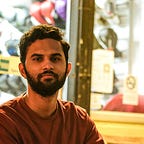Incubator for Creators
Over the last few weeks, I’ve been thinking a lot about what I want to do next. The creator world has fascinated me and someone recently pointed out that a lot of my hobbies are creative endeavours. Until a few weeks earlier, I wouldn’t dare to say that I’m a creative person. I just don’t see myself being a professional DJ or a full time film maker or even an author. But when I took a step back, I realised that creativity is a scale and everyone lies somewhere on it. Just like everything else, the more you do it, the better you get at it. The lack of monetary incentives hold many of us, including myself, back form doing more and thus never moving up the creativity scale. The people who keep at it, get better and better and end up making their craft their career.
No-Code
The recent no-code movement has really changed the digital landscape. What needed lines of code can now be done using a simple drag and drop interface and this has ushered a whole new level of creativity. I myself built up my website using a simple tool like Notion. It’s not the most elegant website, not optimised for SEO etc. but it gets the job done. And that’s the most important part. The power of technology has been made accessible to millions and what will follow will be nothing short of spectacular.
Creator tools
Creator tools have been around for a while. We’ve had blogs, radio, vinyl discs and mobile phones with cameras for a while now. The newest iPhone boasts of a camera which can “make movies like the movies”. You can start a blog on Medium for free. You can host a podcast on Anchor for free. You can start DJing with Rekordbox for free. And with all the above, and more, getting better and better over the years, it’s never been easier to be a creator. I’ve spent the last year playing around with these and even though I’m not good enough to make any of them my full time job, I’ve gotten better at them and have started adding value to people.
Getting paid
The biggest problem, and this bit a chicken an egg problem, is you can’t make earn a living unless you have a sizeable audience. You don’t need millions, but you do need more than a handful. I’ve written an essay about how everyone is a creator with a micro audience, and if you can add value to them, you can build a career out of your craft. At the end of the day, getting paid is just a sign that you’re adding value to someone’s life. As people move away from materialistic things to experiences and digital products, there’s a a shift in where money is being spent. However, to build this audience and find the best way to add value, it takes time. I’ve described this in some detail in another essay labeled YouTubers — a new asset class. The bottom line is that monetising is hard. At early stages, people don’t want to pay for content and the revenue from ads is so small that it doesn’t even make sense
Incubate creators
So with all the above context and my most recent experience at Entrepreneur First, which is a startup incubator, I’ve been exploring to possibility of an incubator for creators where we would do 2 things
- Financially support promising creators as they build their audience and figure the best way to add value to their audience
- Offer creators resources which includes a network of creators who have built successful careers using their craft, equipment and studios to bring their content to life in the best way possible and a community of people who can support each other towards the same goal
Casey Neistat, who inspired me to start making video, started something similar called 368 back in 2018. I’m not sure what ended up happening with that, but I thought it was so cool! He was building a physical space in NYC for creators to come together — Cooking shows, gamers, podcaster — all kinds of creators!
So, just like other talent investors (like Entrepreneur First and Antler), we would invest into creators very early and help them build up their craft. We would invest in them, just like VCs invest in companies and when they succeed, we succeed with them. This creates a sustainable business model with incentives which are aligned.
Not a VC
Given the nature of the “investment” this model will look like a VC, but will have to be completely different. However, for the average individual you can think of this being a sort of an early investor who is taking a risk on a person with a hope a returns in the future. But since there’s no company per se and the longevity of creators is shorter, you need to go back to first principle to figure how to make the model work. a16z recently announced the Talent x Opportunity Initiative, which “discovers and supports cultural geniuses in building large, enduring businesses around their cultural breakthrough in a way that lets creators retain majority ownership of their companies”. It’s great to see progress in this direction and this is just the start. Asia is buzzing with great talent and I feel something like this would do really well in this part of the world.
If you’re a creator, I’d love to speak to you and hear what you think about this. If you know creators who you think might find this useful, I’d really appreciate it you share this with them.
This essay is a part of my 30 day writing challenge. You can read more about why I’m doing it here
